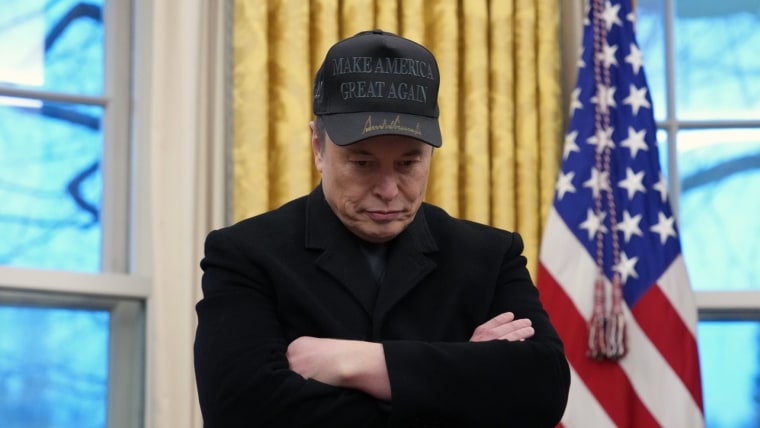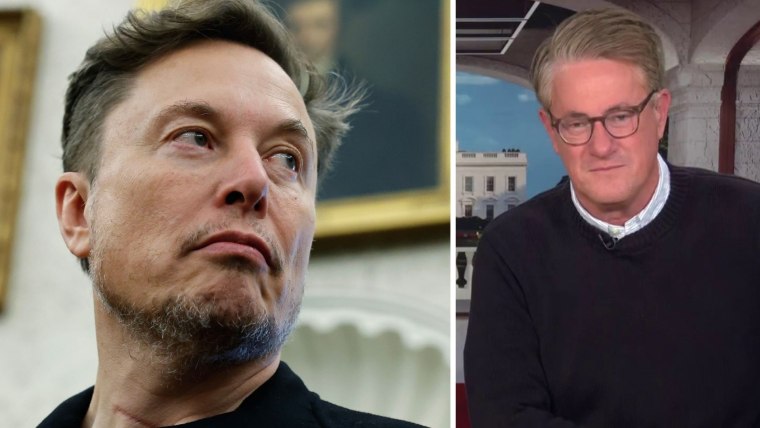Elon Musk’s government service has supposedly come to an end, with the billionaire decamping to his company town of Starbase, Texas. Except there he was in the Oval Office on Friday, in a press availability alongside President Donald Trump. Sporting a black eye — given to him by his 5-year-old, he said — Musk grumbled about his time in the nation’s capital. “We became essentially the DOGE bogeyman,” Musk said. “It just became a bit ridiculous.”
That complaint echoed similar comments in his media tour preceding that appearance, as Musk whined about his DOGE stint not turning out quite as triumphantly as he had hoped. “The federal bureaucracy situation is much worse than I realized,” he told The Washington Post. “DOGE is just becoming the whipping boy for everything.” Not only that, “People were burning Teslas. Why would you do that? That’s really uncool.”
Musk didn’t know how things worked, wasn’t interested in learning and didn’t care how many people he would hurt.
In other words, his noble effort at reform was undone by the deep state, and all he got for it was a heap of criticism and slumping sales for his car company. Won’t somebody pity the billionaire?
Musk has teams of acolytes around him who will no doubt be eager to reassure him that if some people in Washington don’t adore him, that just means they didn’t deserve him in the first place. But in truth, Musk’s feelings are irrelevant; what matters is the chaos he brought to the federal government that serves all of us, and the deaths he is at least partly responsible for around the world. The malignancy that is his Department of Government Efficiency project lives on, not only in the cadre of incompetents he has left behind in Washington, but in the spirit of gleeful destruction ever more firmly incorporated into Republican ideology.
Musk’s time in Washington was characterized by a toxic combination of ignorance, arrogance and malevolence. He didn’t know how things worked, wasn’t interested in learning and didn’t care how many people he would hurt. All of it stemmed from his belief that not only is government incapable of doing anything right, almost everything it tries to do isn’t worth doing anyway. So if he had an impression that an agency was bad — say, the U.S. Agency for International Development — what would be the point of learning its goals and methods? Just shut the whole thing down.

The demise of USAID is one of the most horrific legacies of Musk’s time in Washington. The abrupt cutoff of food aid to vulnerable people around the world “has destabilized some of the most fragile locations in the world and thrown refugee camps further into unrest,” according to internal State Department documents obtained by ProPublica. The withdrawal of medical assistance — especially through PEPFAR, the spectacularly successful U.S. program that fights the spread of HIV in Africa — is already leading directly to people’s deaths, almost certainly by the thousands. Some studies have concluded that hundreds of thousands of people either have died or will die because the U.S. government, at Musk’s urging, has all but shut down its foreign humanitarian efforts.
The experience of USAID was repeated in agency after agency, often at Musk’s whims or to serve Musk’s interest. The Consumer Financial Protection Bureau, which used to protect Americans from financial scams, could cause problems for Musk’s plans to add payment services to his social media platform X. But now CFPB staff have been sent home, and the agency has essentially ceased to function.
Even if Musk and some his top lieutenants are gone, their underlings are still in the federal government.
We saw a pattern repeated over and over: Musk’s DOGE staffers would descend on a government office, demand access to critical systems and start destroying programs they didn’t bother to understand. Officials who stood up to them were fired. Contracts were canceled, offices were closed, and people who relied on services were abandoned.
That damage can’t easily be undone, and even if Musk and some his top lieutenants are gone, their underlings are still in the federal government. And while the shock of what DOGE was doing may have been appalling to most of us, to Republicans in both the executive branch and Congress, it was thrilling (though Republicans on Capitol Hill have been less thrilled about formalizing DOGE’s cuts into law). They’ve now assimilated Musk’s ethos as their own: break everything you can see, fire as many committed employees as possible, don’t worry about consequences to people’s lives, and if what you’re doing is illegal, well, maybe the courts will sort that out later.
And no, Musk was never going to cut $2 trillion from the budget; the fact that he thought he could just showed how clueless he was. But his contempt for the government and the public servants who work in it was obvious from the outset. He wanted indiscriminate destruction, and he got it.

Now he claims to be peeved that the Republican megabill doesn’t reduce the deficit, as though that was ever something the GOP cared about. If he’s really concerned, perhaps he should use some of his billions to lobby for tax increases on the wealthy.
For all his complaints, Musk is getting most of what he really wanted. His time in the government coincided with the Trump administration shutting down many investigations Musk faced over his labor and environmental practices. The administration is also moving to direct billions of dollars in funding meant for rural broadband to his satellite company, and Trump’s new idea for a “Golden Dome” missile defense system looks like a contracting gravy train with Musk’s companies in the front car.
So why isn’t Musk happy? The answer isn’t that he didn’t succeed, because in most ways he did. What upsets him is this: He didn’t just want to lay waste to the government and enrich himself. He wanted to do that and then have us thank him for it.
Tell that to a mother watching her child die from malnourishment, or a skilled park ranger who got fired from their dream job, or someone in tornado alley who can’t get updated weather forecasts, or AIDS patients who no longer have lifesaving medication. I’m sure they’ll be very sympathetic.

